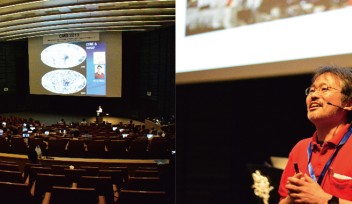OIST and One Young World Japan help empower the next generation of social entrepreneurs in Japan

As the world grapples with urgent environmental challenges, nurturing youth leaders who embrace social responsibility and sustainability in their business models and mindsets is crucial. This was the theme of this year’s spring camp at the Okinawa Institute of Science and Technology (OIST), which hosted 30 high school students from across Japan, including 10 from Okinawa.
The camp was held from 21 to 25 March and was a collaborative event organized by OIST and One Young World Japan. One Young World is the world's biggest forum for next-generation leaders, and OYWJ is the Japanese chapter of One Young World. Students selected to participate in this thought-provoking workshop were tasked with creating real-life solutions to address ongoing environmental concerns in Onna, the village where OIST is located.
The complex problems we face today often require multiple people and ideas to solve, including the support from different groups of society. Recognizing this, the camp focused on developing students’ leadership skills and capabilities, encouraging them to experiment by creating an environment that fostered innovation.
With a range of interactive, hands-on sessions, students had the opportunity to learn from role models, including successful social entrepreneurs, researchers, and local government officials, among others.
Selected as a Sustainable Development Goals (SDGs) Future City by the Government of Japan, Onna village is recognized for its outstanding efforts in working to achieve a sustainable society. In fieldwork sessions held at the Onna Village Museum, students gained insight into the unique characteristics of the village and its efforts to achieve the 17 SDGs. They learned about the significance of building partnerships with the community to promote an ecological and economic balance, and to work together to achieve a sustainable future for all.
Innovation is the key to the success of any major business today. Mr. Hiroshi Osamura, a teacher from Fukuoka Futaba High School, delivered an insightful session on the importance of creating reliable plans for innovation when tackling some of the most complex social, economic, and environmental problems that we face. This was followed with interactive sessions that helped students improve their strategic thinking by examining the different components of their proposed solution and identifying the best ways to work towards their goal.
The camp, conducted primarily in English, featured inspiring speakers who shared their experience and expertise. Kristin Udui, the communications coordinator for the Friends of the Palau National Marine Sanctuary, highlighted the success of Palau's commitment to ocean protection and introduced the Palau Pledge, a promise made by every visitor to protect Palau's natural environment.

Mr. Narayan Lal Gurjar, a social entrepreneur and founder of EF Polymer, a startup born at OIST, shared his journey of creating a business model based on an innovative biodegradable polymer that addresses water scarcity and handles bio-waste problems at the same time. Mr. Robin Lewis, the co-founder of Mymizu, a company that offers a water refill app throughout Japan, is dedicated to reducing plastic bottle waste in the country. In his talk, Mr. Lewis shared how to work towards creating lasting change through entrepreneurship.

Lastly, Mr. Justin Foster Sutherland, OIST English language Instructor, delivered an impactful session on English presentation skills which left a significant impression on the participants.
One of the camp participants said, “I was able to improve my understanding by exchanging opinions with my peers from all over the country. I got the opportunity to talk to and learn from many world-class experts and role models at OIST, who have accomplished dreams like my own, so I am very happy that I participated!”
On the final day, the students, who had been divided into seven groups, presented their innovative and feasible solutions for creating a more sustainable and harmonious environment in Onna village by 2030. An expert panel, consisting of OIST researchers, Onna village officials, and other workshop presenters, selected the project “LightUp” as the winning proposal. It recommended a deep ecological tourism approach for Onna village, which would minimize the negative impact of increased tourism through the implementation of eco-friendly practices, reservation systems, designated conservation rest days, and comprehensive environmental education.
Creator: Megha Kalra















